Assassination of Rafic Hariri
On 14 February 2005, former Prime Minister of Lebanon Rafic Hariri was killed along with 21 others in an explosion in Beirut, Lebanon. Explosives equivalent to around 1,000 kilograms (2,200 pounds) of TNT were detonated as his motorcade drove near the St. George Hotel. Among the dead were several of Hariri's bodyguards and former Minister of the Economy, Bassel Fleihan.
| Assassination of Rafic Hariri | |
|---|---|
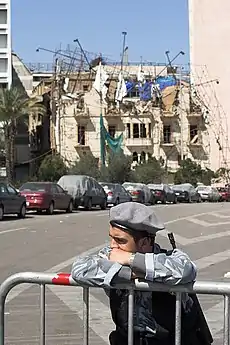 Ministry of the Interior soldier guarding the site of the attack that killed Hariri | |
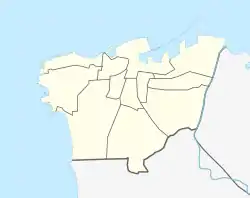 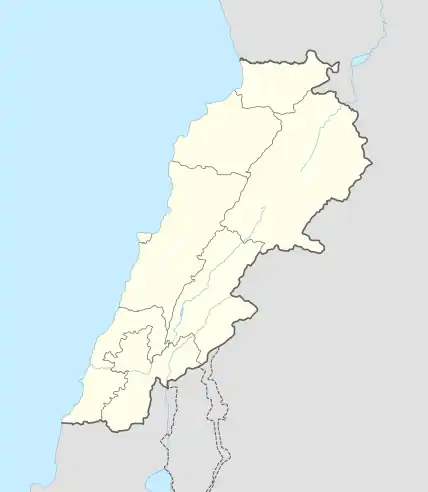 | |
| Location | Beirut, Lebanon |
| Coordinates | 33°54′07″N 35°29′40″E |
| Date | 14 February 2005 |
| Target | Rafic Hariri |
Attack type | Truck bombing |
| Weapons | Truck bomb |
| Deaths | 22 |
Hariri had been part of the anti-Syrian opposition in Lebanon. His assassination triggered the Cedar Revolution, a popular movement which forced Syria to withdraw all its troops in Lebanon by April 2005.[1] The killing also led the United Nations to set up the Special Tribunal for Lebanon to investigate the killing. The Special Tribunal, along with an independent investigation carried out by Lebanese Brigadier General Wissam Al-Hassan, found compelling evidence for the responsibility of the Lebanese group Hezbollah in the assassination.[2][3][4] One of the investigators, Wissam Eid, was assassinated in 2008.[5]
In August 2020, judges at the Special Tribunal for Lebanon found Salim Ayyash, a mid-level operative in Hezbollah, guilty in absentia of five charges including the intentional murder of Hariri with premeditation by using explosive materials. Three other defendants were acquitted. The panel of judges concluded there was "no evidence that the Hezbollah leadership had any involvement in Hariri's murder and there is no direct evidence of Syrian involvement." Hezbollah denied any involvement and its leader, Hassan Nasrallah, refused to allow the arrest of Ayyash.[5]
Background
It will be Lahoud.. opposing him is tantamount to opposing Assad himself.. I will break Lebanon over your head and over Walid Jumblatt’s head. So you had better return to Beirut and arrange the matter on that basis.
— Bashar al-Assad to Rafic Hariri after summoning him to a meeting at Presidential Palace, Damascus in August 2004[6]
Hariri and others in the anti-Syrian opposition had questioned the plan to extend the term of Lebanese President Emile Lahoud, emboldened by popular anger and civic action that became the Cedar Revolution. Lebanese Druze leader Walid Jumblatt, a newer recruit of the anti-Syrian opposition, said after the assassination that in August 2004 Syrian President Bashar al-Assad threatened Hariri personally in a meeting, saying "Lahoud represents me ... If you and Chirac want me out of Lebanon, I will destroy Lebanon."[7] His account is quoted, but not confirmed, in the UN's FitzGerald Report. The report stops short of directly accusing Damascus or any other party, saying that only a further thorough international inquest can identify the culprit.[8]
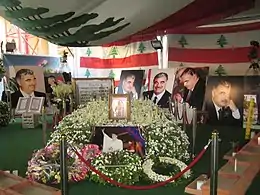
According to these testimonies, Hariri reminded Assad of his pledge not to seek an extension for Lahoud's term, and Assad replied that there was a policy shift and that the decision was already taken. He added that Lahoud should be viewed as his personal representative in Lebanon and that "opposing him is tantamount to opposing Assad himself". He then added that he (Assad) "would rather break Lebanon over the heads of Hariri and [Druze leader] Walid Jumblatt than see his word in Lebanon broken".[9]
According to the testimonies, Assad then threatened both longtime allies Hariri and Jumblatt with physical harm if they opposed the extension for Lahoud. The meeting reportedly lasted for ten minutes, and was the last time Hariri met with Assad. After that meeting, Hariri told his supporters that they had no other option but to support the extension for Lahoud. The mission has also received accounts of further threats made to Hariri by security officials in case he abstained from voting in favor of the extension or "even thought of leaving the country."[10] Irish journalist Lara Marlowe also reported that Hariri told her he had been threatened by Assad.[11]
In an interview with Der Spiegel, President Assad said, "I never threatened him and no Syrian intelligence officer has ever pointed a gun to his head."[12] On the other hand, then-Vice President Abdul Halim Khaddam who defected from the Ba'ath party due to Assad's handling of Lebanese crisis stated in an interview to Al Arabiya that Bashar threatened Hariri with "extremely harsh words". According to Khaddam: "No Syrian security service can reach a decision independently, besides the president. Bashar told me that people in Syria were involved [in the assassination] and that means that he was involved."[13][14]
On 2 September 2004, the UN adopted United Nations Security Council Resolution 1559, which called for Syria to end its 29-year occupation of Lebanon.
Assassination
On the morning of 14 February, Hariri visited parliament and then the Café de l'Etoile for about twenty minutes. He left the cafe in a six-car convoy and followed a route that was kept secret until the very last minute.[15] Six and a half minutes after leaving the cafe, as the convoy neared the St. George Hotel on the Corniche, a truck bomb exploded, destroying the convoy.[15]
The blast left a crater thirty feet wide in the Corniche. A total of 22 people, including Hariri, were killed, and 220 more were injured. Dozens of cars were set on fire, several buildings were knocked down, and windows were blown out on many more.[16]
Hariri was buried, along with the bodyguards who died in the bombing, in a location near Mohammad Al-Amin Mosque.
A videotape found hanging from a tree claimed responsibility for the blast by the "Nusra and Jihad Group in Greater Syria".[2] No such group had been heard from before.[15] A tape aired by Al Jazeera showed a bearded man, believed to be a Palestinian named Ahmad Abu Adas, claiming the attack. Adas' home was raided, but he remains missing. A 2012 UN report on the murder speculated he may have been the suicide bomber but also quotes a witness who said Adas had nothing to do with the bombing.[9] A 2015 report by the New York Times states that DNA evidence shows Adas was not the bomber, but had been lured into making the video in order to cast blame on the Sunnis, and was then probably killed.[2]
The UN report determined that the bomb had been placed in a white Mitsubishi Canter truck, based on CCTV footage from a nearby HSBC bank.[9] It was likely detonated by a suicide bomber in the vehicle, which would have evaded the electronic jamming devices of Hariri's convoy. Investigators determined that the Mitsubishi truck had been stolen from Sagamihara, Japan, on 12 October 2004.[9]
Investigation
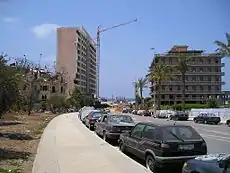
On 7 April 2005 the United Nations Security Council unanimously adopted Resolution 1595 to send an investigative team to look into Hariri's assassination. The team, led by German judge Detlev Mehlis, presented its initial findings in the so-called Mehlis report to the Security Council on 20 October 2005.
The report implicated Syrian and Lebanese officials, with special focus on Maher al-Assad, Assef Shawkat, Hassan Khalil, Bahjat Suleiman and Jamil Al Sayyed.[17][18] Maher al-Assad is the brother of Syrian president Bashar al-Assad, and Assef Shawqat, a powerful figure within the government, was married to their sister Bushra. Suleiman is a top Syrian security official and Al Sayyed, the only Lebanese of the four, was the head of Lebanon's General Security Department at the time of Hariri's assassination.
Eyewitness testimonies of an August 2004 meeting between Bashar al-Assad and Rafic Hariri published in the report states:
"According to Mr. Hariri, Assad told him: "Lahoud is me. I want to renew his mandate... If Chirac wants me out of Lebanon, I will break Lebanon.".. President Assad had threatened him directly and told him, that voting against the extension would be considered as being directed against Syria. According to Mr. Hariri, President Assad added that in that case they, the Syrians, would "blow him up" and any of his family members and that they would find them anywhere in the world."[19]
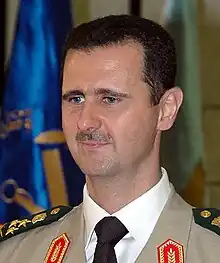
In the wake of the report, United States President George W. Bush called for a special meeting of the UN to be convened to discuss international response "as quickly as possible to deal with this very serious matter."[22][23] Meanwhile, Detlev Mehlis asked for more time to investigate all the leads.
Lebanese politicians asked to extend the investigative team's duration and charter, to include assassinations of other prominent anti-Syrian Lebanese figures around that time, such as the journalist Samir Kassir (killed by a car bomb in June 2005) and Gebran Tueni (also killed by a car bomb, in December 2005).
A second report, submitted on 10 December 2005, upheld the conclusions from the first report. On 11 January 2006, Mehlis was replaced by the Belgian jurist Serge Brammertz.
The Lebanese government agreed to this inquiry, though calling for the full participation, not supremacy, of its own agencies and the respect of Lebanese sovereignty.[24] The UN Security Council voted unanimously to demand full Syrian cooperation with UN investigators in the matter, and Brammertz's last two reports praised Syria's full co-operation.[25]
On 30 August 2005, four pro-Syrian Lebanese generals (some of whom had promoted the false Abu Addas theory) were subsequently arrested under suspicion of conspiracy to commit murder. They were detained without charge by Lebanese authorities for four years and released by the STL when it took over the investigation in 2009.[26] Mustafa Hamdan, former head of the Lebanese Presidential Guard brigade; Jamil al Sayyed, former director-general of Security General; Ali al Hajj, director general of the Lebanese Internal Security Forces; and Raymond Azar, the former director of the Military Intelligence were released upon an order from the STL pre-trial judge at the request of the prosecutor due to lack of evidence.[27] In making the request, the prosecutor had considered "inconsistencies in the statements of key witnesses and of a lack of corroborative evidence to support these statements."[28]
Syrian Minister of Interior Ghazi Kanaan was interviewed in September 2005 by Detlev Mehlis' team as a "witness" in the assassination.[29] Kanaan denied any involvement in the assassination. On 12 October Kanaan was found dead with a gunshot wound to the head in his Damascus office."[30][29] The Syrian government said it was a suicide, though others claimed it was murder to sever the link between Hariri's death and the regime.[31]
On 30 December 2005, former Syrian Vice President Abdul Halim Khaddam in a televised interview implicated Assad in the assassination and said that Assad personally threatened Hariri in the months before his death.[32] This interview has caused Syrian MPs to demand treason charges against Khaddam.[32]

On 18 December 2006, a progress report by former head of the investigation, Serge Brammertz, indicated that DNA evidence collected from the crime scene suggests that the assassination might be the act of a young male suicide bomber.[33]
On 28 March 2008, the tenth report of the UN's International Independent Investigation Commission found that, "a network of individuals acted in concert to carry out the assassination of Rafic Hariri and that this criminal network – the 'Hariri Network' – or parts thereof are linked to some of the other cases within the commission's mandate."[34][35]
The Security Council extended the mandate for the investigation, which was to end in December 2008, until 28 February 2009.[36]
On 7 February 2012, Hurriyet reported investigators from the United Nations interviewed Louai Sakka, interested in whether he had played a role in the assassination.[37]
UN Special Tribunal
The government of Lebanon and United Nations agreed to establish a Special Tribunal for Lebanon in 2007, signing the agreement on 23 January 2007 and 6 February 2007 respectively. When the agreement was sent to the Lebanese Parliament for ratification, however, the Speaker refused to convene Parliament to vote on it.[38] Upon request from a majority of members of the Lebanese parliament[39] and the Prime Minister,[40] the United Nations Security Council adopted Resolution 1757, implementing the agreement.[41]
For reasons of security, administrative efficiency and fairness,[42] the tribunal has its seat outside Lebanon, in Leidschendam, on the outskirts of The Hague, the Netherlands. The premises of the tribunal is the former headquarters of the Dutch General Intelligence and Security Service (Algemene Inlichtingen- en Veiligheidsdienst, or AIVD).[43][44] The Netherlands originally agreed to host the tribunal on 21 December 2007.[45] The court opened on 1 March 2009.[46]
The tribunal is the first international court to prosecute terrorism as a distinct crime.[47][48]
On 29 April 2009, following a request of Prosecutor Daniel Bellemare, the pre-trial judge determined that the four suspects arrested during the investigation could not be considered "as either suspects or accused persons in the proceedings pending before the Tribunal" and ordered their unconditional release.[49] The detained persons were General Jamil al Sayyed (head of General Security), General Ali al Hajj (chief of internal security forces, the Lebanese police force), Brigadier-General Raymond Azar (head of Army Intelligence) and Brigadier-General Mustafa Hamdan (head of the presidential guard). Considered as Syria's main rule-enforcing agents at the time, they spent nearly 3 years and 8 months in detention after Lebanese authorities arrested them on 1 September 2005, and during that period no charges were ever pressed against them. Their release came amidst a tense political atmosphere in Lebanon, due to the officially admitted heavy politicization of the affair. Several anti-Syrian political figures have stated that "[we] still consider them as guilty."
On 30 June 2011, Haaretz reported that the Tribunal had submitted to Lebanon's Prosecutor General indictments of four Lebanese Hezbollah members, and a foreigner. The indictments were served by representatives of the International Court of Justice at The Hague.[50]
One of the Special Tribunal's leading figures was Lebanese Brigadier General Wissam al-Hassan. On 19 October 2012, al-Hassan was assassinated in a car explosion in the Achrafieh district of Beirut.[51]
Prosecutor v. Ayyash et al. began on 16 January 2014[52] with an opening statement from the prosecution.[53] Salim Jamil Ayyash, Hassan Habib Merhi, Hussein Hassan Oneissi, and Assad Hassan Sabra were on trial in absentia,[54] as it was determined they had absconded and did not wish to participate in the trial.[55]
On 18 August 2020, the Special Tribunal for Lebanon found Salim Ayyash, a mid-level operative in Hezbollah, guilty in absentia of five charges including the intentional murder of Hariri with premeditation by using explosive materials. Three other defendants were acquitted. The panel of judges concluded there was "no evidence that the Hezbollah leadership had any involvement in Hariri's murder and there is no direct evidence of Syrian involvement". Hezbollah denied any involvement and its leader, Hassan Nasrallah, refused to allow the arrest of Ayyash.[5][56] This was in spite of the fact that already by 2015 the tribunal (based on earlier work by Lebanese police captain Wissam Eid, who was assassinated in 2008) had uncovered five groups of cellphones involving scores of operatives. The only operatives whom the tribunal was able to identify were Ayyash (the leader of Hezbollah's Jaber Force unit), Merhi (commander of Hezbollah's special forces in Lebanon), Oneissi (according to the prosecutors the man who lured Adas into making the fake claim of responsibility), Sabra, and Mustafa Badreddine, a military leader of Hezbollah who was assassinated in 2016.[2]
In March 2021, the United States has offered a $10 million reward for providing information about Salim Ayyash, fugitive Hezbollah suspect convicted over Hariri's assassination.[57]
Hezbollah
In August 2010, in response to notification that the UN tribunal would indict some Hezbollah members, the Secretary General of Hezbollah Hassan Nasrallah said Israel was looking for a way to assassinate Hariri as early as 1993 in order to create political chaos that would force Syria to withdraw from Lebanon, and to perpetuate an anti-Syrian atmosphere in Lebanon in the wake of the assassination. He went on to say that in 1996 Hezbollah apprehended an agent working for Israel by the name of Ahmed Nasrallah – no relation to Hassan Nasrallah – who allegedly contacted Hariri's security detail and told them that he had solid proof that Hezbollah was planning to take his life. Hariri then contacted Hezbollah and advised them of the situation.[58] Saad Hariri (Rafic Hariri's son, who has also served as PM of Lebanon) responded that the UN should investigate these claims.[59]
Aftermath
Hariri was well-regarded among international leaders; for example, he was a close friend of French President Jacques Chirac. Few felt he was a threat, due to his ties with the EU and the West. Chirac was one of the first foreign dignitaries to offer condolences to Hariri's widow in person at her home in Beirut. The Special Tribunal for Lebanon was also created at his instigation.
Following Hariri's death, there were several other bombings and assassinations against anti-Syrian figures. These included Samir Kassir, George Hawi, Gebran Tueni, Pierre Amine Gemayel, and Walid Eido.[60][61][62] Assassination attempts were made on Elias Murr, May Chidiac, and Samir Shehade (who was investigating Hariri's death).[63][64][65]
See also
References
- Rudy Jaafar and Maria J. Stephan. (2009). "Lebanon's Independence Intifada: How an Unarmed Insurrection Expelled Syrian Forces", in Maria J. Stephan (ed.), Civilian Jihad: Nonviolent Struggle, Democratization, and Governance in the Middle East, New York: Palgrave Macmillan, pp. 169–85.
- Ronen Bergman. (15 February 2015). "The Hezbollah Connection". The New York Times Magazine. Retrieved 5 August 2020.
- "CBC Investigation: Who killed Lebanon's Rafik Hariri? – inquiry chief".
- Avi Issacharoff (9 November 2010). "Report: Hariri tribunal to link top Hezbollah figures to assassination". Haaretz. Retrieved 23 October 2012.
- "Rafik Hariri tribunal: Guilty verdict over assassination of Lebanon ex-PM". BBC News. 18 August 2020. Retrieved 19 August 2020.
- Coughlin, Con (2023). "5: First Blood". Assad: The Triumph of Tyranny. 6 Briset Street, London EC1M 5NR, UK: Pan Macmillan. pp. 80–97. ISBN 978-1-5290-7490-1.
{{cite book}}: CS1 maint: location (link) - Neil MacFarquhar. (20 March 2005). "Behind Lebanon Upheaval, 2 Men's Fateful Clash", The New York Times.
- Warren Hoge. (25 March 2005). "U.N. Cites Syria as factor in Lebanese assassination", The New York Times.
- "Report of the International Independent Investigation Commission established pursuant to Security 1595 (2005)". UN. Retrieved 25 October 2012.
- "Report of the Fact-finding Mission to Lebanon inquiring into the causes, circumstances and consequences of the assassination of former Prime Minister Rafik Hariri" Archived 6 August 2020 at the Wayback Machine. United Nations, 24 March 2005.
- "Assad: 'No Syrian Officer Put a Gun to Hariri's Head. I Never Threatened Him'". Narkive. Retrieved 6 July 2019.
- "Security chiefs held over Hariri murder". 31 August 2005, The Telegraph.
- "Former Syrian VP Says Assad Was Involved in Hariri's Death". Haaretz. 30 December 2005.
- Whitaker, Brian (23 June 2022). "Unaccountable in Lebanon: How a PM's Killers Got Away With It". News Lines Magazine. Archived from the original on 23 June 2022.
- Brian Whitaker (22 June 2005). "Beirut murder mystery". The Guardian. Retrieved 25 October 2012.
- Joshua Hammer. (December 2008). "Getting Away With Murder?" The Atlantic, December 2008.
- "UN Harīrī probe implicates Syria", BBC News, 21 October 2005.
- John Kifner and Warren Hoge (21 October 2005). "Top Syrian seen as prime suspect in assassination". The New York Times.
- Mehlis, Detlev (19 October 2005). "Report of the International Independent Investigation Commission Established Pursuant to Security Council Resolution 1595 (2005)" (PDF). p. 7. Archived from the original (PDF) on 21 October 2005.
- Coughlin, Con (2023). "5: First Blood". Assad: The Triumph of Tyranny. 6 Briset Street, London EC1M 5NR, UK: Pan Macmillan. pp. 80–97. ISBN 978-1-5290-7490-1.
{{cite book}}: CS1 maint: location (link) - "The 2003 meeting that set the stage for Hariri's assassination". The Arab Weekly. 6 August 2020. Archived from the original on 14 February 2021.
- Reichman, Deb (21 October 2005). "Bush urges UN to act on charge of Syrian involvement in assassination". The Seattle Times. Retrieved 20 June 2023.
- "President Discusses Mehlis Report from United Nations: Ronald Reagan Presidential Library, Simi Valley, California". White House Office of the Press Secretary. (21 October 2005).
- "Lebanon agrees to Harīrī inquiry", BBC News, 25 March 2005.
- Lynch Colum; Robin Wright. "U.N. pressures Syria on assassination probe". The Washington Post. Retrieved 22 May 2010.
- "Generals held in Hariri killing walk free". CNN. 29 April 2005. Retrieved 3 March 2017.
- "Order Regarding the Detention of Persons Detained in Lebanon in Connection with the Case of the Attack against Prime Minister Rafiq Hariri and Others". STL Pre-Trial Chamber. 29 April 2009. Retrieved 3 March 2017.
- "Order Regarding the Detention of Persons Detained in Lebanon in Connection with the Case of the Attack against Prime Minister Rafiq Hariri and Others". STL Pre-Trial Chamber. 29 April 2009. paragraph 34(vi). Retrieved 3 March 2017.
- "Syrian minister commits suicide". CNN. 13 October 2005. Retrieved 7 July 2012.
- "Syrian minister 'commits suicide'". BBC. 12 October 2005. Retrieved 7 July 2012.
- Horacio Calderon (25 August 2010). "Winds of War in the Levant and Middle East The Hariri and AMIA cases" (Working Papers 14). CAEI. Retrieved 20 July 2012.
- "Harīrī 'threatened by Syria head'". BBC News. 30 December 2005.
- "UN probe into murder of former Lebanese leader nears sensitive stage – inquiry chief". 18 December 2006. United Nations. Retrieved 5 August 2020.
- "UN says 'network' killed Hariri". BBC News. 28 March 2008. Retrieved 28 March 2008.
- Adam Zagorin. (16 April 2008). "Syria, US at Odds Over Hariri Probe". Time.
- "Security Council extends probe into Lebanon killings for another two months". UN News Centre. 17 December 2008.
- "United Nations commission in Istanbul to investigate Louai Sakka". Hurriyet. 7 February 2012. Retrieved 6 August 2012.
Two members of the United Nations International Investigative Commission are in Istanbul to research possible links between top Al Qaeda operative Louai Sakka and the assassination two years ago of former Lebanese prime minister Rafik Hariri.
- "Lebanon's Siniora asks U.N. to set up Hariri court". Reuters. 14 May 2007. Retrieved 27 January 2017.
- "Ban Ki-moon receives Lebanese memo on planned tribunal for Hariri killing". United Nations News Centre. 4 April 2007. Retrieved 27 January 2017.
- "Letter dated 15 May 2007 from the Secretary-General to the President of the Security Council" (PDF). United Nations Security Council. 16 May 2007. Retrieved 27 January 2017.
- "UN Security Council Resolution 1757(2007)". Retrieved 8 November 2016.
- "UN Security Council Resolution 1757 (2007)". Annex – Agreement between the United Nations and the Lebanese Republic on the establishment of a Special Tribunal for Lebanon, Article 8. Retrieved 8 November 2016.
- "Lebanon's Special Tribunal to be located in former Dutch Intelligence HQ". NOW News. 21 December 2007. Archived from the original on 15 November 2016. Retrieved 8 November 2016.
- "Hariri court to be based in former Dutch intelligence HQ: official"
- "Special Tribunal for Lebanon to be Based at The Hague". United Nations News Centre. 21 December 2007. Retrieved 27 January 2017.
- "Security Council Press Statement On Special Tribunal for Lebanon". United Nations Security Council. 3 March 2009. Retrieved 27 January 2017.
- David Tolbert (2014). "Introduction: A Very Special Tribunal". In Amal Alamuddin; Nidal Nabil Jurdi (eds.). The Special Tribunal for Lebanon: Law and Practice. Oxford University Press. pp. 1–9. ISBN 978-0-19-968745-9.
- "Lebanon's groundbreaking tribunal". 21 April 2006. BBC News. Retrieved 5 August 2020.
- "Order Regarding the Detention of Persons Detained in Lebanon in Connection With the Case of the Attack Against Prime Minister Rafiq Hariri and Others". STL. 29 April 2009. paragraph 39. Retrieved 27 January 2017.
- "Report: Hezbollah officials receive indictments in Hariri murder probe". Haaretz. Archived from the original on 3 September 2011. Retrieved 23 October 2012.
- "unknown". Naharnet. Retrieved 23 October 2012.
{{cite news}}: Cite uses generic title (help) - "Media Advisory – Media Accreditation for Start of Trial at the STL". STL. 23 December 2013. Archived from the original on 26 December 2013.
- "Ayyash et al. Opening Statement". STL (youtube.com). 16 January 2014. Retrieved 5 August 2020.
- "Press Release: In absentia proceedings". STL. 1 February 2012. Archived from the original on 20 October 2017.
- "Decision to Hold Trial In Absentia". STL Trial Chamber. 1 February 2012.
- "Hezbollah member found guilty over killing of Rafik Hariri". The Guardian. 18 August 2020.
- "US offers $10m for Hezbollah fugitive over Hariri killing". Arab News. 29 March 2021. Retrieved 29 March 2021.
- "Nasrallah: Israel used secret agent to turn Lebanon gov't against Hezbollah". Haaretz. Retrieved 5 August 2020.
- "Lebanon PM: UN must probe claims of Israeli complicity in Hariri murder". Haaretz. Retrieved 5 August 2020.
- Mallat, Chibli. Lebanon's Cedar Revolution An essay on non-violence and justice (PDF). Mallat. p. 124. Archived from the original (PDF) on 2 February 2012.
- "Chronology Of Events: 2005". Mediterranean Politics. 11 (2): 279–308. 2006. doi:10.1080/13629390600683048. S2CID 220378402.
- "Hariri Reaches Out to Opponents, As Another anti-Syrian politician is Killed". Asharq Alawsat. 21 June 2005. Archived from the original on 16 January 2014. Retrieved 23 April 2013.
- "Attacks on the Press 2005: Lebanon". Committee to Protect Journalists. 16 February 2006. Retrieved 10 June 2022.
- AsiaNews.it. "Bomb wounds top intelligence officer". www.asianews.it. Retrieved 10 June 2022.
- Agencies (12 July 2005). "Lebanese minister hit by car bomb". the Guardian. Retrieved 10 June 2022.
Bibliography
- Jürgen Cain Külbel: Mordakte Hariri: Unterdrückte Spuren im Libanon, 2006, ISBN 3-89706-860-5
- Jürgen Cain Külbel: Ietail Al-Hariri. Adellah Machfiyyah, 2006, ISBN 3-89706-973-3
- Nicholas Blanford: Killing Mr. Lebanon: The Assassination of Rafiq Hariri and Its Impact On the Middle East, 2006, ISBN 1-84511-202-4
External links
- The Mehlis Report from the United Nations (pdf)
- Hariri Murder coverage fropm YaLibnan, with photo gallery
- UN Security Council media release on briefing of Security Council
- Hariri, Homicide and The Hague op-ed by The Hague Centre for Strategic Studies
- The Syrian Gambit Unravels from antiwar.com
- Rafic Hariri Memorial – 3d where he was killed.
- Report presented to UN Security Council implicating Syrian and Lebanese officials – UN.org, 20 October 2005
- MacDonald, Neil. CBC Investigation: Who killed Lebanon's Rafik Hariri?, CBC News, 21 November 2010